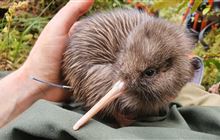New home for kiwi at Fox Glacier
Archived content: This media release was accurate on the date of publication.
Introduction
A new population of rowi kiwi is in the making for mainland New Zealand after an historic release near Fox Glacier.Date: 14 December 2018
DOC and Te Runanga ō Makaawhio, alongside the Fox community, welcomed 27 juvenile rowi to their new home at Lake Gault in the Omoeroa ranges on Thursday.
Wayne Costello, South Westland Operations Manager says in 1995 rowi were thought to number just 160 individuals, clinging on in South Okārito Forest.
“DOC Rangers working on the recovery programme over the last 20 years have successfully filled Okārito Forest to near capacity and a new home needed to be found. On the brink of extinction just a short while ago, rowi have also had their threat classification status downgraded from Nationally Critical to Nationally Vulnerable.
“The Omoeroa Ranges will be the perfect new home for the rowi.
“The release into the new territory marks more than a generation of innovation and achievement in kiwi conservation and is testament to the work of rangers, researchers and technology developers who help us find smarter and more efficient ways of saving kiwi.
“We have progressed from labour intensive ground searches for kiwi to technology that allows us to monitor nests from the air. This has allowed us to bring this population back from the edge of extinction to fill a forest and now start a new population of kiwi. “One day we will be able to hear kiwi calling from the popular Matheson walk, and perhaps even from town”.
The public event included a powhiri to welcome the rowi to their new home, with children from the local primary school and preschool helping in the welcome and naming some of the new arrivals.
The released rowi will be monitored to see where they choose to establish their home ranges.
More about rowi
Rowi were once found throughout the western and northern part of the South Island, as well as the lower North Island, but due to predation from stoats became confined to a remnant population in Okarito forest, just to the north of Franz Josef.
Operation Nest Egg sees vulnerable kiwi eggs collected from wild nests, hatched and reared in captivity and raised in predator free creche areas until they are of a size that can fend off stoats – over 1.5 kg.
Rowi are hatched at the West Coast Wildlife Centre, raised at Willowbank in Christchurch, and then mature on islands in the Marlborough Sounds. The programme receives ongoing support from Air New Zealand, Wildbase and Dunedin Wildlife Hospital, Kaipupu sanctuary, E-Ko tours and Te Waonui Forest retreat.
Contact
For media enquiries contact:
Email: media@doc.govt.nz


